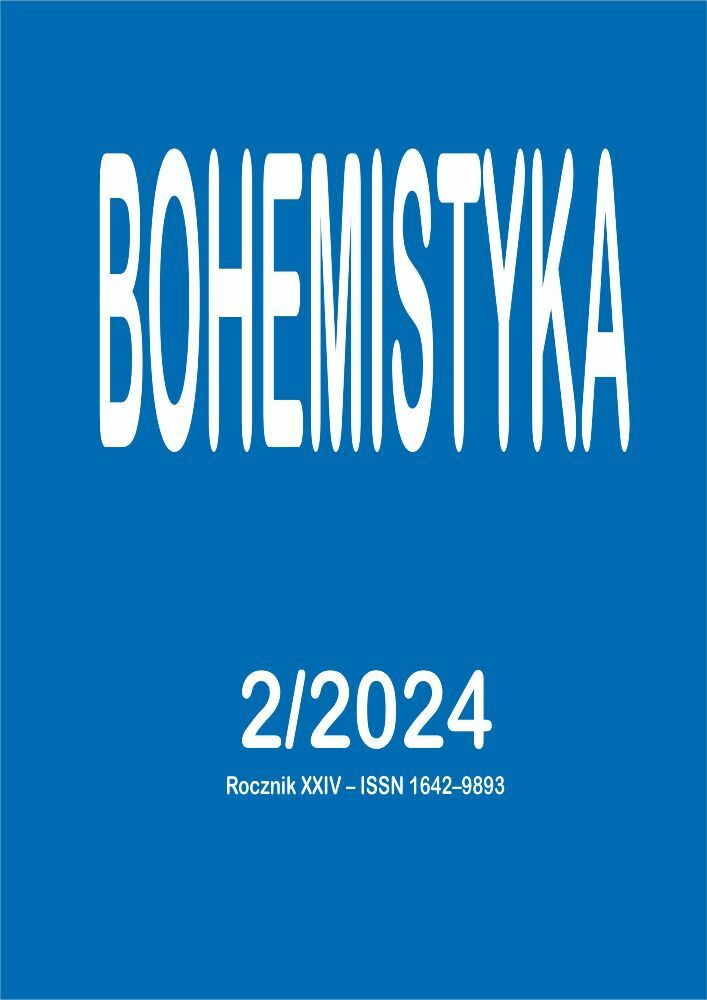Abstract
Czech literature in Poland is associated primarily with a detached – ironic and/or humorous approach to the reality, which is at the same time indulgent and willing to accept „the existing shape of the world” in all its manifestations approach to reality. In other words, it is not usually associated with the expression of pessimistic moods, focused on exposing the negative aspects of existence. This image, deformed or rather radically reduced, although at the same time corresponding to one of the variants of Czech autoimagology, requires a kind of untruth or at least supplementation. Looking at this culture from a different, „darker” side and finding a different axiological pers- pective in it, therefore, turns out to be a convenient tool for revalorization and – as a result – may contribute to the development and dissemination of its more complex description, which would take into account various models of emotional attitude to reality and allowed to set new research trails. Even a cursory examination of Czech literature, both published in recent years and from earlier times (including Hašek and Hrabal), proves that it not only does not avoid expressing a negative worldview, but also often makes it the primary „hallmark” of its noetic position
References
Ajvaz M., 1993, Druhé město, Praha: Mladá fronta.
Ajvaz M., 2011, Lucemburská zahrada, Brno: Druhé město.
Bałus W., 1996, Mundus melancholicus. Melancholiczny świat w zwierciadle sztuki, Kraków: Universitas.
Bieńczyk M., 1998, Melancholia. O tych, co nigdy nie odnajdą straty, Warszawa: Sic!
Chvatík K., 2004, Od avantgardy k druhé moderně (cestami filozofie a literatury), Praha: Torst.
Földényi L. F., 2011, Melancholia, przeł. R. Reszke, Warszawa: Wydawnictwo KR.
Fuks L., 1983, Vévodkyně a kuchařka, Praha: Československý spisovatel.
Hodrová D., 2011, Chvála schoulení (Eseje z poetiky pomíjivosti), Praha: Malvern.
Hrabal B., 1991, Inzerát na dům, ve kterém už nechci bydlet, Praha: Melantrich.
Hrabal B., 2005, Příliš hlučná samota, Praha: Maťa.
Kowalski P., 2004, Popkultura i humaniści. Daleki od kompletności remanent spraw, poglądów i mistyfikacji, Kraków: Wydawnictwo Uniwersytetu Jagiellońskiego.
Kratochvil J., 1995, Avion, Brno: Atlantis.
Krchovský J. K., 1998, Básně, Brno: Nakladatelství Host.
Kristeva J., 2007, Czarne słońce. Depresja i melancholia, przeł. M. P. Markowski, R. Ryziński, Kraków: Universitas.
Málek P., 2008, Melancholie moderny. Alegorie – vypravěč – smrt, Praha: Dauphin.
Marciniak H., 2009, Svět se stává stále menším... melancholický pohled v díle Jindřicha Štyrského, „Slovo a smysl” 11/12, s. 120–131.
Nowakowski A., 1995, Apoteoza sztuczności, w: Stulecie Młodej Polski, red. M. Podraza-Kwiatkowska, Kraków; Universitas, 1995, s. 481–489.
Orska J., 2005, Sztuka na rynku, w: Kanon i obrzeża, red. I. Iwasiów, T. Czerska, Kraków: Universitas, s. 137–150.
Sontag S., 2014, Pod znakiem Saturna, przeł. D. Żukowski, Kraków: Karakter.
Starobinski J., 2013, Melancholie v zrcadle. Tři přednášky o Baudelairovi, přel. J. Hrdlička, Praha: Malvern.
Śniedziewski P., 2011, Melancholijne spojrzenie, Kraków: Universitas.
Świeściak A., 2010, Melancholia w poezji polskiej po 1989 roku, Kraków: Universitas.
Urban M., 2003, Stín katedrály. Božská krimikomedie, Praha: Argo.
Vaněk-Úvalský B., 2000, Poslední Bourbon, Brno: Petrov.
License
Copyright (c) 2024 Anna Gawarecka

This work is licensed under a Creative Commons Attribution-NonCommercial-NoDerivatives 4.0 International License.





